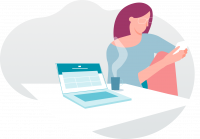What is repeat overdraft use?
If your account is mostly or always overdrawn, we class this as repeat overdraft use. We understand you might need it to cover increasing living costs or you’re between jobs. But doing so could lead to you receiving high charges. This could indicate that you’re experiencing financial difficulties.
As a responsible lender, we monitor how you’re using your overdraft. We’re here to support you through these difficult times.
Why could repeat overdraft use become a problem?
An overdraft is intended for short term use. It can be helpful in emergencies, but it can be very expensive.
Using it for long-term borrowing or large amounts can lead to financial difficulty.
- There are high costs for using an overdraft.
- Regular overdraft use can lead to a cycle of debt if you rely on it as part of your monthly expenses.
- If you go over your arranged overdraft limit, we call it an unarranged overdraft. This can impact your credit file and make it harder to get credit in future. It can also have negative effects on future banking requirements.
How will you know you’re using your overdraft too much?
If you’re using your overdraft for long periods, you may get a letter or email from us. We’ll give you some options of how we can help you break the cycle. We’ll also give you some tips to reduce or avoid overdraft costs.
Even if you don’t hear from us, there is still support available if you’re worried.
Why is it important to take action?
If you’re always worried about money, it can lead to stress and affect your health. It can also affect your credit score, which might limit your options for things like getting a phone contract or a mortgage.
Sometimes we might take steps to help you pay back the balance in full. In some cases we might reduce the limit or remove your overdraft.
Acting early can mean you have more control of your money and can stop things getting worse.
What should you do?
Fill in a budget planner to see a breakdown of your expenses.
By using a budget planner, you could:
- See where you might be able to cut costs and save money
- Prepare for the future and meet your financial goals
- Reduce or consolidate any debt.
We understand money worries can be difficult to talk about. Our support section has tools and information to help if finances are a struggle.
If you'd like further help with managing your overdraft, you can contact us.
There are other ways we can support you managing or reducing your overdraft, here are a few examples of how we can help:
- Repayment plan – This is an agreement to make regular payments to repay your unarranged overdraft balance. We’ll suspend your interest during the time of the agreement.
- Monthly Reducing Overdrafts - 'We can make a plan to help you gradually pay off your overdraft balance.We'll work with you to make sure it's affordable, and we might agree to put interest charges on hold for a while. This would let you clear the overdraft balance while still using your account.
- Breathing space – This gives you time to contact a third party to develop a repayment plan. We’ll suspend any interest during this time.
- Paydown – This is a monthly repayment amount which clears the overdraft. We’ll block the account so you won’t be able to use it.
We tailor these support options to your individual circumstances once we’ve done an affordability assessment with you. Any agreements in place will impact your credit file. We’ll continue to share account performance updates with an arrangement flag to the credit reference agencies, but speaking to us about your options won’t impact your credit file.
Not sure where to start? Use MoneyHelper’s Debt Advice Locator tool to find the right support.
